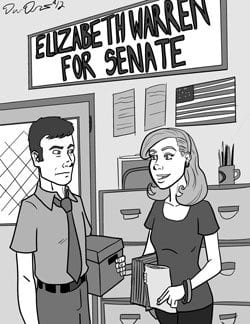
Sen. Brown’s racial confusion
The customary public opinion of Sen. Scott Brown was that he is a good guy trapped in a deteriorating political party. However, the recent debate with Elizabeth Warren changed all that. Brown’s crude assault on her ethnic heritage was unconscionable. Many people now see him as simply another Republican who will do or say anything to stay in office.
With a sluggish economic recovery and high unemployment plaguing the country, Brown dug right in by challenging Warren’s assertion that her forbears had Native American blood. In an insensitive and clueless remark he said, “You can see that she isn’t [Native American].”
Unfortunately, Brown did not explain to the TV audience just how to identify a person of mixed European and Native American ancestry. Racial identification has been a major American obsession since slavery. In the Jim Crow South, it was not unusual for a fair-skinned citizen with distant African American ancestry to go to court in order to be adjudicated as Caucasian to avoid the inconvenience of segregation.
Clearly Sen. Brown has little understanding of the history of Oklahoma, part of the wild and woolly West and Warren’s home state. It was not until 1907 that Oklahoma became a state. Prior to that it was known as The Indian Territory. With passage of the Indian Removal Act of 1830, national policy was to resettle Native Americans from their ancestral homes in the South to Oklahoma.
Blacks and Native Americans were not well-treated in Oklahoma. In 1921 the most violent anti-black riot in American history erupted in Tulsa. According to accounts, 10,000 blacks were left homeless when their houses were destroyed and 300 blacks were killed.
Discrimination against Native Americans was also pervasive. It would have been demeaning for a white family to acknowledge any Indian ancestry. That is probably why Warren did it. She wanted to be clear that she was not failing to recognize any of her diverse family. Warren is so competent and talented she did not need special ethnic privileges. It must have been a matter of pride for her to claim her achievements on behalf of her ancestors who may well have been considered to be inferior and were undoubtedly the victims of racial discrimination.
In order to combat racial bigotry, Americans adopted affirmative action as a strategy to make racial discrimination more difficult. Many whites have vigorously opposed the policy. In his 1990 race for re-election to the U.S. Senate, Jesse Helms of North Carolina successfully ran offensive anti-affirmative action ads to defeat Harvey Gantt, his black opponent. Brown is playing the same race card against Elizabeth Warren.
Brown’s tepid disapproval of the anti-Indian antics of his supporters indicates support for a racial focus that has no place in Massachusetts politics. Voters should indicate their disapproval at the polls.
Vote No on Question 2
Americans are free to terminate their lives without special legal consequences. However, anyone else they might involve in the enterprise will have to answer to the criminal law for their own conduct.
Question 2 on the November ballot wants to change that. Anyone who is diagnosed by a doctor with a terminal illness and is determined to have only six months to live may then obtain a prescription for medication that will end his or her life. The doctor will suffer no legal consequences.
It is customary for citizens of the Bay State to want more freedoms rather than greater restrictions, but Question 2 is potentially harmful for several reasons, including:
1. It is not uncommon to be misdiagnosed as having a terminal illness, and patients often survive well beyond the projected six months;
2. There is no more distressing time than to be informed of one’s imminent death, and Question 2 provides inadequate protections against a bad decision; and
3. Question 2 would enable a doctor to violate restrictions of the Hippocratic Oath, which has established medical ethics relied on by doctors for centuries.
While every individual indeed has the right to terminate his or her life, Question 2 fails to provide adequate precautionary provisions to permit the legally sanctioned involvement of others. Citizens should vote “no” on Question 2.






